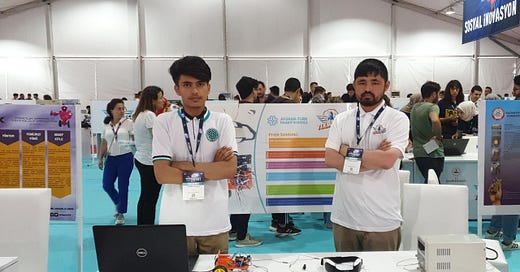Mind Over Matter
Afghan innovator Yasir Osmani is refining his smart wheelchair for the mass market

“What else can I add?” His award-winning smart wheelchair design incorporates four different methods of functionality, including voice and mind control alongside a glove and joystick, an auto brake system, and space for a GPS sensor. In the future, he plans to add solar panels so that its battery can be charged automatically. His aim—to create a wheelchair that responds to every need—seems near-complete. All he needs now is the capital to develop it.
That is difficult to find in Afghanistan, where Osmani lives, so he is looking abroad. “The next step is to secure a patent because this is the first wheelchair design that can be controlled by four different methods, including the mind,” the 17-year-old says. Other methods include voice-activated movement, a joystick on the armrest, and a glove that responds to small finger movements.
He first had the idea after seeing a video of theoretical physicist and cosmologist Stephen Hawking controlling his wheelchair with brain waves. Searching online, he couldn’t find a similar product on the mass market. “I decided to make a smart wheelchair that was not only available to scientists but to all people,” he says. His smart system uses sensors on a headset to capture neurons produced by the brain, then analyses them to determine the wheelchair’s next maneuver. He has written the code himself, allowing the chair to move forward, backward, or stop according to the values transmitted via waves from the brain.
“Beta waves are produced when the mind is busy, and when a certain value is reached, the chair will move forward. When we are relaxed, the Alpha waves increase, and the chair will begin to reverse,” he explains. At present, the chair moves a few seconds in either direction because Osmani is busy refining the headset to achieve greater levels of accuracy. “It’s all about gaining those values from the brain, which is difficult, but once you capture them, then it’s easy to set the code.”
With the wheelchair prototype now in the latter stages of development, he is focused on securing a patent to attract overseas investors. Feedback so far has been encouraging. In 2022, he won the Best Ideas category at the prestigious Teknofest competition in Istanbul with his miniature prototype. This gave him the confidence to apply for an Innovation Hub grant with Ideas Beyond Borders. “It was a big achievement for me to secure the grant. It really helped me,” he says.
Osmani used the fund to purchase parts from overseas and build the first full-scale model of his smart wheelchair design. Sourcing these materials was not easy. He ordered them via Amazon from companies in China, where the parts were cheapest, but they got stuck at the Afghan-Pakistan border. Eventually, Osmani managed to convince officials of the merits of his project and the opportunities it could open up for the country. “People seem really interested in this product, so I have decided to develop it further,” adds Osmani, who has created several advanced projects in the robotics club at school, including an artificial arm controlled by the mind.
His confidence in the smart wheelchair pushed him to apply multiple times for Teknofest, accepting two rejections before he was accepted into the competition that he went on to win. Learning from setbacks is his philosophy for success in life. “Those two failures taught me the secrets of applying for that competition. I’m not scared of failing. Whether I win or lose, it’s important to try.”
This article was written by Olivia Cuthbert.



